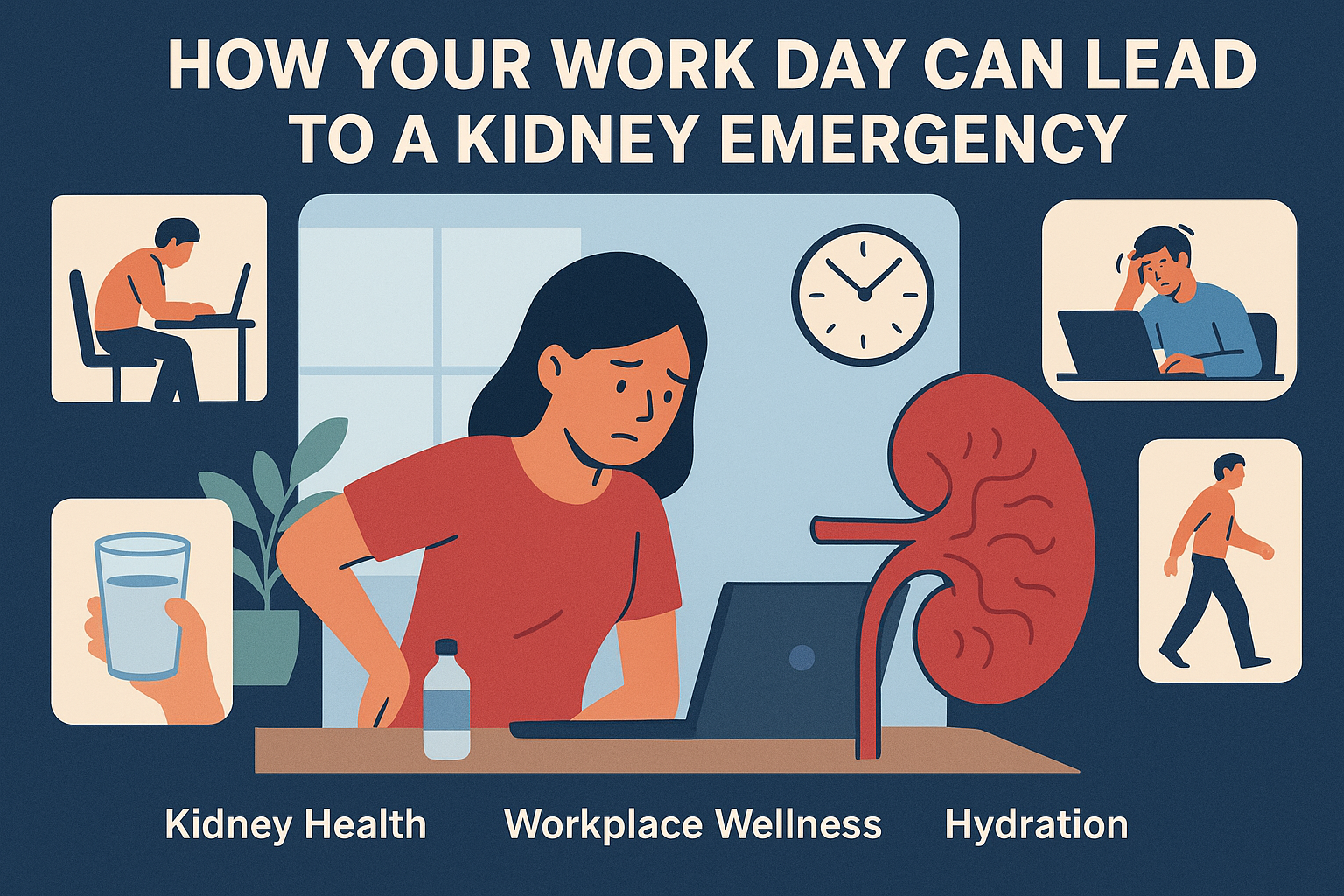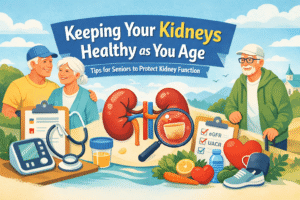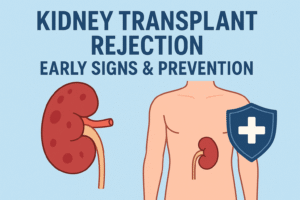Habits of sedimentation at the workplace that may affect the well-being of the kidneys. Neither a proper diet nor appropriate medical care alone maintains kidney health; a portion of what one does in his or her daily routine at work also matters. Individuals spend several hours at their desks without paying much attention to the concerns of staying hydrated, moving, and stressing. These small patterns could be detrimental to the operations of the kidneys in the long run. The first major move to long-term wellness is to appreciate the impact that your workday has on your Healthy Kidneys.
How Can Your Day-to-Day Job Routine Contribute to Kidney Functioning?
The health of your kidneys is affected by your daily routine more than you may have imagined. The posture prolongs the blood circulation and raises the pressure with which the kidneys become strained. Working without water breaks causes dehydration, and when one works continuously, the cortisol accumulates in the body, so it overworks the kidneys. The simple lifestyle choices are also enough to accumulate and enhance the risks of having chronic kidney disease (CKD). A little change in daily routine can bring a long-term change in kidney health.
Why Is Hydration at Work Important to the Well-being of the Kidneys?
Water hydration facilitates every process that the kidneys have to undergo, such as the filtration of waste and electrolyte balance. You are not taking water, and hence your urine is concentrated and thus which can lead to kidney stones or infections. The most convenient practice is the one engaging the carrying of a refillable water bottle and turning on hourly alerts, as it will make sure you stay consistent throughout your working hours, and you will not expose your kidneys to any dangers during working hours. Maintaining hydration during the day directly leads to improved kidney health.
How Many Liters of Water Should One Take in a Regular Working Day?
The amount of water needed every day is about eight glasses a day, but it depends on the individual. Extra attention is possible as your occupation might be linked to excessive working hours in air conditioning or any other stressful, unfriendly atmosphere. The electrolyte level is regulated by keeping it hydrated, and wastes are not accumulated. One of the simplest methods of ensuring that you are not damaging your kidney health at the workplace is to monitor the color of your urine; when it is light yellow, it is an indicator that you are hydrated.
Spending Too Much Time at Work: Does It Increase the Risk to the Kidneys?
Yes, sitting too long or poor posture may contribute. Lack of physical activity slows down circulation and leaves the body less efficient in terms of balancing the sugar and fat levels, which can impair kidney function. Another serious predisposing factor to kidney disease is obesity and diabetes, both common in office life. Scheduling an exercise throughout the day makes your metabolism and kidney health active.
What Gentle Motion Can Benefit Your Kidneys and Body?
Break up long-time sitting, walking, stretching, or standing at desks. Even the minimal exercises, like a stand-up meeting or a stroll down the corridor, will get the blood circulation going and will make the muscles relax. These are but a few that can be done to help reduce the load on your kidneys, get more oxygen to your body, and make the best of flushing out toxins during working hours. These minor measures are quite beneficial to the future kidney health.
How Does Work Stress Affect the Health of the Kidneys?
Stress elevates blood pressure and discharges stress hormones, such as cortisol, which may diminish the functionality of the kidneys in the long run. It is also a vicious cycle, as when you are stressed, your sleep and hydration can also be influenced, as well. Emotional stress management through healthier behaviors you should have at your workplace is among the most important aspects of preserving the health of your kidneys and avoiding long-term complications.
What Are the Healthy Coping Ways for Work Stress?
Breathe deeply, practice mindfulness, and take short meditations at work. Having a work-life balance and adequate sleep allows your kidneys to rest and recover. Even relaxation methods can lower blood pressure and relieve the kidneys of unnecessary burden. Your diet and hydration are just as important to keep your kidney health safe as your mental well-being.
Bad Work Eating Habits – Can They Damage Your Kidneys?
Yes, sodium and phosphorus in fast foods, processed snacks, and sweetened drinks that are common in offices can aggravate the condition of the kidneys. Long-term disease is caused by unhealthy eating, resulting in high blood pressure and retention of fluid. Eating a healthy diet and low-sugar and low-salt food will ensure your body is alert and reduce the risk of getting chronic kidney disease. When people eat in the workplace consciously, it will be beneficial in keeping the kidneys healthy in the long run.
What Foods That Are Kidney-Friendly Should You Eat at Your Office?
Low-fat protein foods, fresh fruit, greens, and whole grains. Good office snacks include yogurt or nuts since they do not have so much salt. Limit the intake of caffeine or soda drinks because they tend to dehydrate you. Small but proportional meals will aid in ensuring that you keep yourself and energy refreshed throughout the day as you work. This is the food that is significant to the good health of the kidneys.
What Long-Term Actions Can Office Workers Take to Prevent Kidney Problems?
Kidney complications are prevented by routine checkups, regular physical exercise, and proper hydration. Early medical consultation concerning the Hypertension Diagnosis & Management and other preventive procedures is necessary in cases of swelling, fatigue, or urine discoloration. These early preventive steps help you avoid irreversible kidney damage later in life and safeguard your kidney health.
When to See a Nephrologist Regarding Workplace Health Habits
You need to visit a nephrologist when you realize that you are constantly dehydrated, your blood pressure is higher than it should be, or you get frequent urinary infections. A consultation that happens early aids in the identification of any difficulties that may arise in the kidney before it worsens. Preventive healthcare makes sure that your kidneys are fit in spite of long working hours, stress, or long work time at a desk. An early step will go a long way in helping you maintain your kidney health.
How Does Southern Oklahoma Kidney Center Create Awareness on Workplace Kidney Health?
A program to teach people about kidney health behaviors in the workplace has been embraced in the Southern Oklahoma Kidney Center, Ardmore, OK, and Gainesville, TX. They have specialist nephrologists who offer preventive care programs and patient education sessions so that the employees will choose healthier options at work and at home. These programs result in better, long-term outcomes.
What Are the Resources for Employees Concerned About Their Kidneys?
Wellness programs, kidney health screenings, and lifestyle counseling are available based on individual needs. Educational materials help patients recognize early signs of kidney issues. The preventive approach ensures every employee learns simple ways to protect their kidneys, small actions that make a big difference over time. This awareness builds a better workplace for kidney health.
What Are Preventive Kidney Health Consultations and How Can Patients Participate?
Once you are ready to take charge of your kidney health, schedule a preventive check-up through SouthernOKC.com. The healthcare team provides customized renal tests and expert support to ensure that you stay healthy and comfortable in your work environment. Taking action today can protect your future; proactive care guarantees long-term kidney health.





